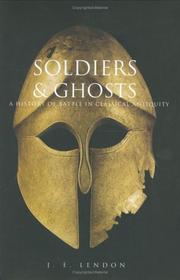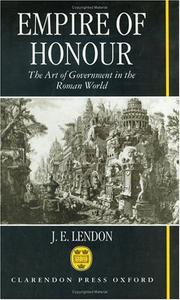| Listing 1 - 4 of 4 |
Sort by
|

ISBN: 0300106637 9780300106633 9780300119794 0300119798 Year: 2005 Publisher: New Haven (Conn.) : Yale university press,
Abstract | Keywords | Export | Availability | Bookmark
 Loading...
Loading...Choose an application
- Reference Manager
- EndNote
- RefWorks (Direct export to RefWorks)
"Ranging from the Battle of Champions between Sparta and Argos in 550 BC through Julian's invasion of Persia in 363 AD, Soldiers and Ghosts brings to life the most decisive military contests of ancient Greece and Rome. J.E. Lendon places these battles, and the methods by which they were fought, in a sweeping narrative of ancient military history. On every battlefield, living soldiers fought alongside the ghosts of tradition - ghosts that would inspire greatness for almost a millennium before ultimately coming to stifle it."--Jacket.
Antieke krijgsgeschiedenis --- Histoire militaire de l'Antiquité --- Krijgsgeschiedenis [Antieke ] --- Krijgsgeschiedenis van de oudheid --- Military history [Ancient ] --- Military history, Ancient. --- Military art and science --- Histoire militaire ancienne. --- Art et science militaires --- Oorlogvoering. --- Klassieke oudheid. --- History. --- Histoire. --- Military history, Ancient --- Ancient military history --- Military history --- Naval history --- History

ISBN: 0198150792 Year: 2009 Publisher: Oxford : Clarendon press,
Abstract | Keywords | Export | Availability | Bookmark
 Loading...
Loading...Choose an application
- Reference Manager
- EndNote
- RefWorks (Direct export to RefWorks)
Rome --- Politics and government --- Politique et gouvernement --- Empire, 30 B.C.-476 A.D.
Book
ISBN: 9780691221021 9780691221007 9780691221014 0691221014 0691221006 069122000X 0691221022 Year: 2022 Publisher: Princeton (N.J.) : Princeton university press,
Abstract | Keywords | Export | Availability | Bookmark
 Loading...
Loading...Choose an application
- Reference Manager
- EndNote
- RefWorks (Direct export to RefWorks)
The assassins of Julius Caesar cried out that they had killed a tyrant, and days later their colleagues in the Senate proposed rewards for this act of tyrannicide. The killers and their supporters spoke as if they were following a well-known script. They were. Their education was chiefly in rhetoric and as boys they would all have heard and given speeches on a ubiquitous set of themes--including one asserting that "he who kills a tyrant shall receive a reward from the city." In That Tyrant, Persuasion, J. E. Lendon explores how rhetorical education in the Roman world influenced not only the words of literature but also momentous deeds: the killing of Julius Caesar, what civic buildings and monuments were built, what laws were made, and, ultimately, how the empire itself should be run. Presenting a new account of Roman rhetorical education and its surprising practical consequences, That Tyrant, Persuasion shows how rhetoric created a grandiose imaginary world for the Roman ruling elite--and how they struggled to force the real world to conform to it. Without rhetorical education, the Roman world would have been unimaginably different.
Education --- Education. --- Rhetoric, Ancient. --- Rhétorique ancienne. --- Social conditions. --- Rome (Empire). --- Rome --- Conditions sociales. --- Rhetoric, Ancient --- Rhetoric --- Political aspects --- Study and teaching --- Civilization --- 30s BC. --- Allegory. --- Ammianus Marcellinus. --- Ancient Rome. --- Areopagitica. --- Atticism. --- Aulus Gellius. --- Autun. --- Books of Kings. --- Caracalla. --- Catiline. --- Cesare Borgia. --- Cesare Lombroso. --- Classical republicanism. --- Classicism. --- Claudian. --- Commodus. --- Counter-Reformation. --- De Inventione. --- De facto. --- Declamation. --- Declaration of Sports. --- Diocletian. --- Disenchantment. --- Domitian. --- Egypt (Roman province). --- Engagement controversy. --- Engagers. --- Enoch Powell. --- Essay. --- Etymology. --- Euripides. --- Frontinus. --- Harmodius and Aristogeiton (sculpture). --- Hellenistic period. --- Herbert Marcuse. --- Hubris. --- Hydra effect. --- Ideology. --- Imperial cult (ancient Rome). --- Impossibility. --- Iniuria. --- Judicial activism. --- Kenneth Burke. --- Late Antiquity. --- Libanius. --- Livy. --- Loeb Classical Library. --- Lucius Junius Brutus. --- Machiavellianism. --- Marcus Aemilius Lepidus (triumvir). --- Marcus Junius Brutus the Younger. --- Mark Antony. --- Mixed government. --- Narcissism. --- Niccolò Machiavelli. --- Of Education. --- Oliver Cromwell. --- Our Choice. --- Pamphylia. --- Parody. --- Pathogen. --- Patrician (ancient Rome). --- Pilgrimage of Grace. --- Poetry. --- Politics. --- Polyaenus. --- Power of the Sword. --- Praetor. --- Proconsul. --- Puritans. --- Quentin Skinner. --- Quintilian. --- Rab Butler. --- Racism. --- Republicanism. --- Res publica. --- Rhetoric. --- Rhetorica ad Herennium. --- Right of conquest. --- Rivers of Blood speech. --- Roman Empire. --- Roman Law. --- Second Sophistic. --- Seneca the Younger. --- Sententiae. --- Sexuality in ancient Rome. --- Sophocles. --- Suetonius. --- Superiority (short story). --- The Faerie Queene. --- The Machiavellian Moment. --- The Other Hand. --- The Tenure of Kings and Magistrates. --- Tiberius Gracchus. --- Transvaluation of values. --- Tyrant. --- Ulpian. --- Valentinian (play). --- Volumnia.
Book
ISBN: 3806246343 9783806246346 9783806246254 Year: 2023 Publisher: Darmstadt : wbg Theiss
Abstract | Keywords | Export | Availability | Bookmark
 Loading...
Loading...Choose an application
- Reference Manager
- EndNote
- RefWorks (Direct export to RefWorks)
Jon Lendons Buch füllt eine wirkliche Lücke: Erstmals nimmt er die Wirklichkeit antiker Rhetorik in den Blick und zeigt, wie die Redekunst eine grandiose Vorstellungswelt für die römische Herrscherelite schuf - und wie diese darum kämpfte, die reale Welt zu zwingen, sich ihr anzupassen. Die Grundausbildung zum Redner, die alle römischen Politiker wie Cicero, Caesar und Augustus durchlaufen hatten, prägte ihr Weltbild, ihr Miteinander und ihr Machtbewusstsein. Die rhetorische Erziehung hat nicht nur die römische Literatur, sondern auch Politik und bedeutsame Taten beeinflusst: die Ermordung Julius Caesars etwa, welche städtischen Gebäude und Denkmäler gebaut wurden, welche Gesetze erlassen wurden und schließlich, wie das Reich selbst geführt werden sollte. Lendon gelingt es damit, nicht nur erhaltene römische Reden, sondern auch für deren "Aufführung" gedachte Bauwerke (die man noch heute besuchen kann) zu verstehen. Das Buch eröffnet so wirklich einen neuen Blick auf die römische Antike! Inhaltsverzeichnis Einführung 7I. Die seltsame Welt der Bildung im Römischen Reich 131 Bildung im Römischen Reich 142 Die gesellschaftliche und historische Bedeutung der rhetorischen Bildung 27II. Die Ermordung Caesars als eines Tyrannen der Rhetorik 413 Das Attentat 414 Rätsel über die Verschwörung 505 Wer hat rhetorisch gedacht? 66III. Die seltsamen Kinder der Rhetorik: Bauten in den Städten des Römischen Reichs 796 Monumentale Nymphäen 817 Stadtmauern, Säulenstraßen und das rhetorische Kalkül des bürgerlichen Verdienstes 106IV. Eidechsen und andere Abenteuer der Rhetorik und des römischen Rechts 1288 Rhetorik und römisches Recht 1329 Die Anziehungskraft des Rechts der Deklamationen 14110 Rechtsrätsel, bekannte Gesetze und vom römischen Recht abgelehnte Gesetze der Rhetorik 156Rhetorik macht die Welt 175Anhang 186Danksagung 186Anmerkungen 188Bibliographie 282Register 345 Biographische Informationen Jon E. Lendon lehrt an der University of Virginia Alte Geschichte und gilt als einer der wichtigsten amerikanischen Althistoriker.Kai Brodersen ist Professor für Antike Kultur an der Universität Erfurt und Senior Fellow am Alfried Krupp Wissenschaftskolleg in Greifswald. Er ist Autor zahlreicher Bücher zur Antike bei der wbg und u. a. Herausgeber der Reihe »Geschichte kompakt – Antike«.
| Listing 1 - 4 of 4 |
Sort by
|

 Search
Search Feedback
Feedback About UniCat
About UniCat  Help
Help News
News